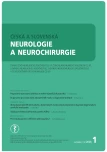The role of dynamic MRI of the cervical spine and dynamic evoked potentials in the diagnosis of degenerative cervical myelopathy
Authors:
S. Žídek 1,2; D. Štěpánek 1,2; J. Valeš 1; M. Vítovec 3; R. Tupý 2,3; V. Rohan 2,4; V. Přibáň 1,2; I. Holečková 1,2
Authors‘ workplace:
Neurochirurgická klinika FN Plzeň
1; LF UK, Plzeň
2; Klinika zobrazovacích metod FN Plzeň
3; Neurologická klinika FN Plzeň
4
Published in:
Cesk Slov Neurol N 2023; 86(1): 41-48
Category:
Original Paper
doi:
https://doi.org/10.48095/cccsnn202341
Overview
Introduction: The study evaluates the effect of flexion and extension of the cervical spine assessed using dynamic MRI on spinal cord functions assessed using dynamic evoked potentials (EPs) in healthy individuals (group 1) and in patients subjectively and objectively with a mild form of degenerative cervical myelopathy without graphic signs of spinal cord compression on static MRI (group 2). Methods: 10 individuals were included in group 1 as well as in group 2. MRI and EPs were performed in neutral position, flexion and extension. The anterior and posterior length of the spinal cord, the transverse and anteroposterior dimensions and the area of the spinal cord were measured on the MRI of cervical spine. Somatosensory EPs of the median nerve and tibial nerve and motor EPs from the muscles of the upper and lower limbs were recorded. Results: In group 2, compared to group 1, we noted a change in spinal cord functions, length and shape of the spinal cord in the neutral position. During flexion and extension, in group 2, as well as in group 1, there was a change in anterior and posterior length, and in contrast to group 1, there was also a decrease in the transverse and anteroposterior dimensions and area of the spinal cord in the C4/5 and C5/6 segments. In addition, somatosensory EPs and motor EPs were altered as well. Conclusion: Movements of the cervical spine cause a change in the shape and function of the spinal cord, differently in healthy individuals and patients with mild degenerative cervical myelopathy.
Keywords:
degenerative cervical myelopathy – dynamic magnetic resonance imaging – dynamic evoked potential
This is an unauthorised machine translation into English made using the DeepL Translate Pro translator. The editors do not guarantee that the content of the article corresponds fully to the original language version.
Download
Sources
1. Milligan J, Rayn K, Fehlings M et al. Degenerative cervical myelopathy: diagnosis and management in primary care. Can Fam Physician 2019; 65 (9): 619–624.
2. Davies BM, Mowforth O, Gharooni AA et al. A new framework for investigating the biological basis of degenerative cervical myelopathy [AO spine RECODE-DCM research priority number 5]: mechanical stress, vulnerability and time. Global Spine J 2022; 12 (Suppl 1): 78S–96S. doi: 10.1177/21925682211057546.
3. Horakova M, Horak T, Valosek J et al. Semi-automated detection of cervical spinal cord compression with the Spinal Cord Toolbox. Quant Imaging Med Surg 2022; 12 (4): 2261–2279. doi: 10.21037/qims-21-782.
4. Muhle C, Wiskirchen J, Weinert D et al. Classification system based on kinematic MR imaging in cervical spondylitic myelopathy. AJNR Am J Neuroradiol 1998; 19 (9): 1763–1771.
5. Dalbayrak S, Yaman O, Firidin MN et al. The contribution of cervical dynamic magnetic resonance imaging to the surgical treatment of cervical spondylotic myelopathy. Turk Neurosurg 2015; 25 (1): 36–42. doi: 10.5137/1019-5149.JTN.9082-13.1.
6. Lee Y, Kim SY, Kim K. A dynamic magnetic resonance imaging study of changes in severity of cervical spinal stenosis in flexion and extension. Ann Rehabil Med 2018; 42 (4): 584–590. doi: 10.5535/arm.2018.42.4.584.
7. Joaquim AF, Baum G, Tan LA et al. Dynamic cord compression causing cervical myelopathy. Neurospine 2019; [ahead of print]. doi: 10.14245/ns.1938202.101.
8. Qi Q, Huang S, Ling Z et al. A new diagnostic medium for cervical spondylotic myelopathy: dynamic somatosensory evoked potentials. World Neurosurg 2020; 133: e225–e232. doi: 10.1016/j.wneu.2019.08.205.
9. Morishita Y, Maeda T, Ueta T et al. Dynamic somatosensory evoked potentials to determine electrophysiological effects on the spinal cord during cervical spine extension: clinical article. J Neurosurg Spine 2013; 19 (3): 288–292. doi: 10.3171/2013.5.SPINE12933.
10. Štěpánek D, Žídek S, Bludovský D et al. Predikce pooperačního stavu u spondylogenní cervikální myelopatie. Cesk Slov Neurol 2013; 77/110 (1): 39–46.
11. Kuwazawa Y, Pope MH, Bashir W et al. The length of the cervical cord: effects of postural changes in healthy volunteers using positional magnetic resonance imaging. Spine (Phila Pa 1976) 2006; 31 (17): E579–583. doi: 10.1097/01.brs.0000229228.62627.75.
12. Mao H, Driscoll SJ, Li JS et al. Dimensional changes of the neuroforamina in subaxial cervical spine during in vivo dynamic flexion-extension. Spine J 2016; 16 (4): 540–546. doi: 10.1016/j.spinee.2015.11.052.
13. LeVasseur CM, Wawrose R, Pitcairn S et al. Dynamic functional nucleus is a potential biomarker for structural degeneration in cervical spine discs. J Orthop Res 2019; 37 (4): 965–971. doi: 10.1002/jor.24252.
14. Nove-Josserand A, Andre-Obadia N, Mauguiere F. Cervical spondylotic myelopathy: motor and somatosensory evoked potentials, clinical and radiological correlation. Rev Neurol (Paris) 2002; 158 (12 Pt 1): 1191–1197.
15. Holmes A, Wang C, Han ZH et al. The range and nature of flexion-extension motion in the cervical spine. Spine (Phila Pa 1976) 1994; 19 (22): 2505–2510. doi: 10.1097/00007632-199411001-00003.
16. Parke WW. Correlative anatomy of cervical spondylotic myelopathy. Spine (Phila Pa 1976) 1988; 13 (7): 831–837. doi: 10.1097/00007632-198807000-00023.
17. Garcia Larrea L, Mauguiere F. Latency and amplitude abnormalities of the scalp far-field P14 to median nerve stimulation in multiple sclerosis. A SEP study of 122 patients recorded with a non-cephalic reference montage. Electroencephalogr Clin Neurophysiol 1988; 71 (3): 180–186. doi: 10.1016/0168-5597 (88) 90003-2.
Labels
Paediatric neurology Neurosurgery NeurologyArticle was published in
Czech and Slovak Neurology and Neurosurgery

2023 Issue 1
Most read in this issue
- Progressive multiple sclerosis in the light of the latest findings
- Dietary approaches specific to patients with multiple sclerosis
- Recommendations for structural brain MRI in the diagnosis of epilepsy
- Stroke specific measurement tools used to assess health related quality of life in young adults after ischemic stroke
